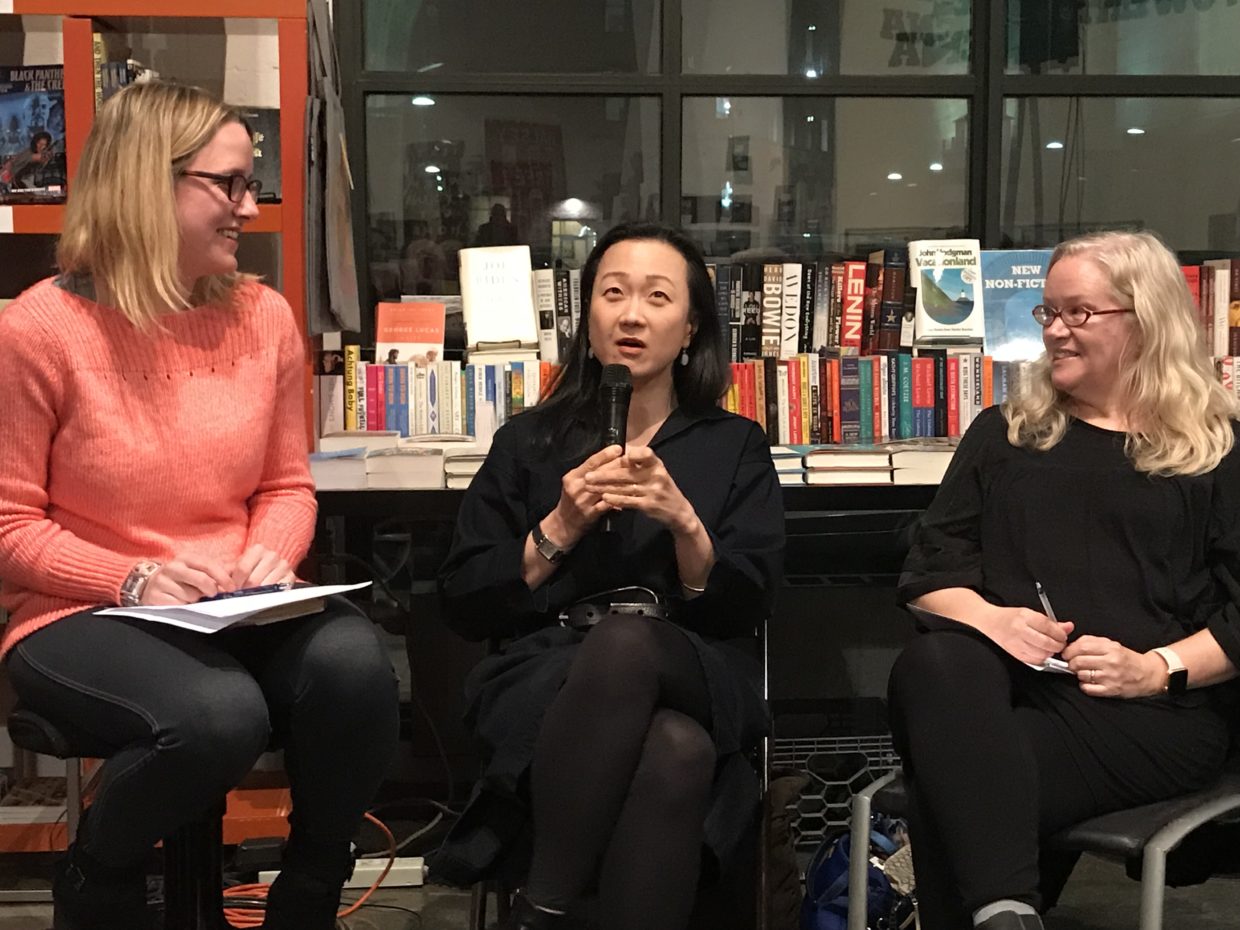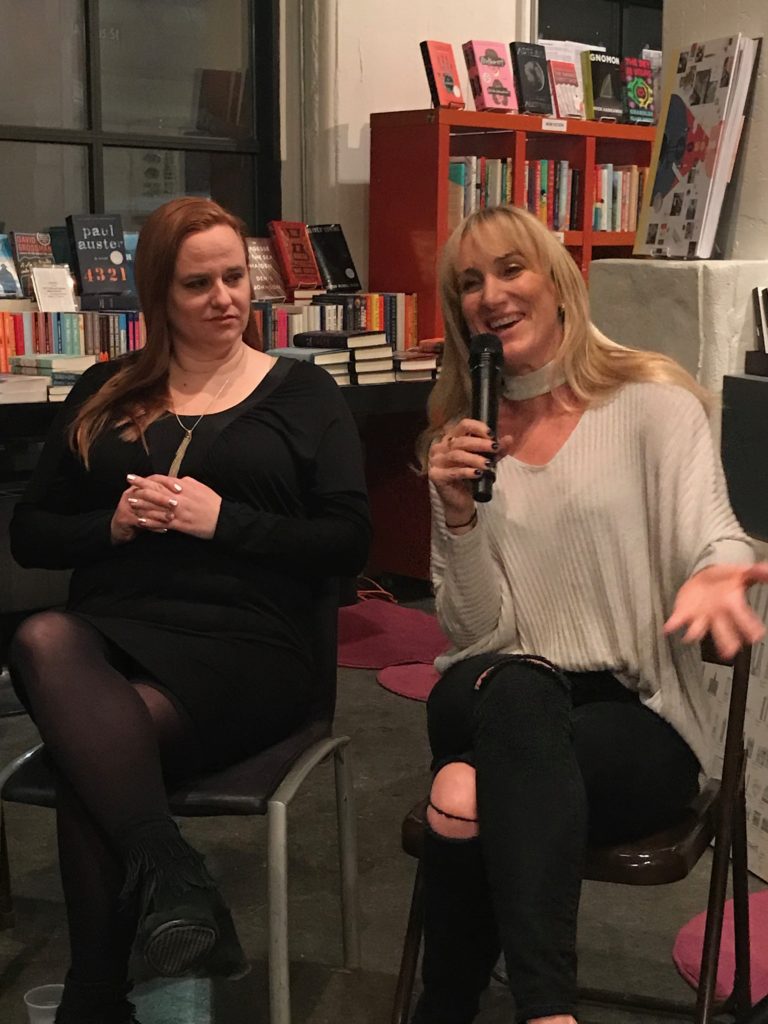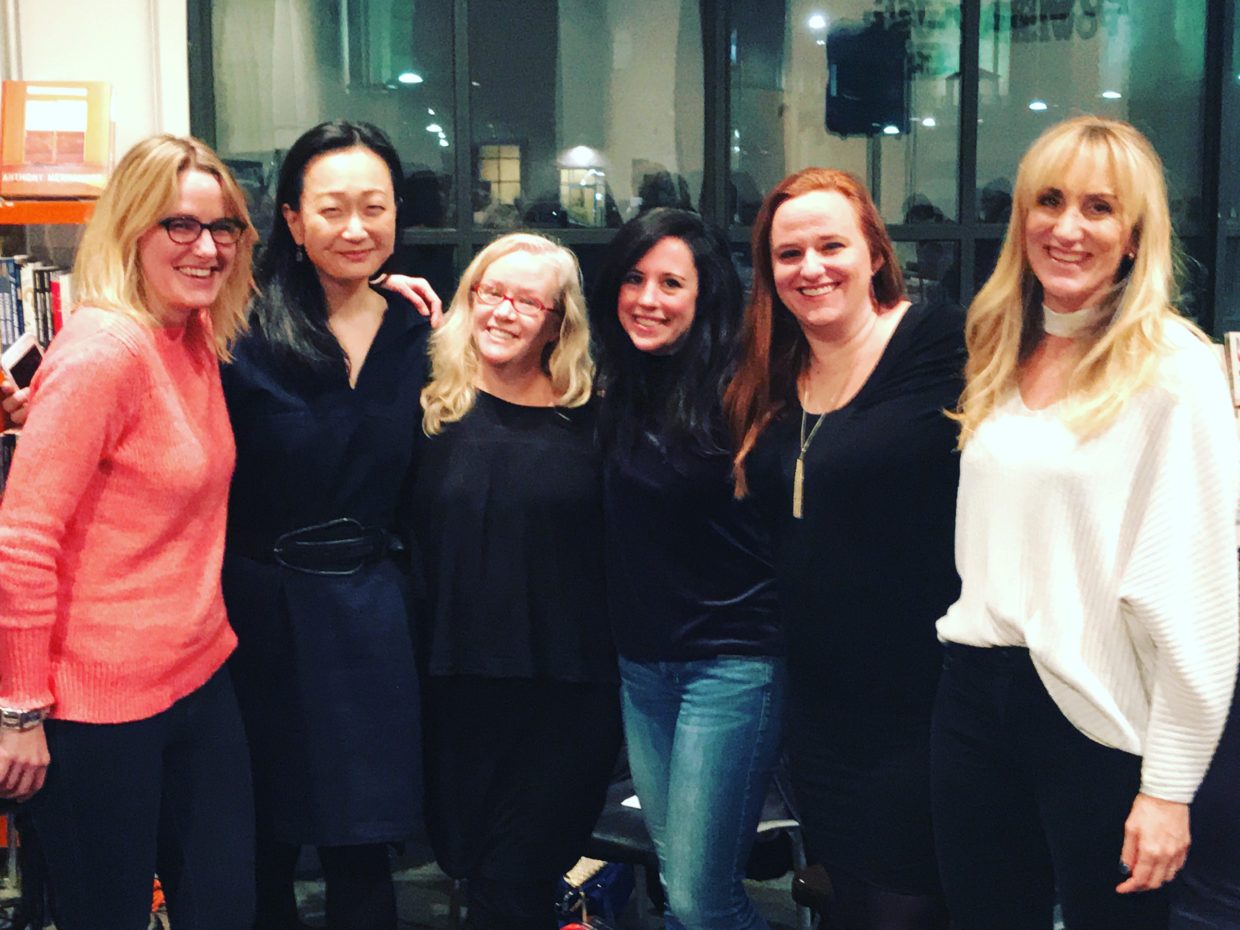
On Envy, Unsatisfied Desire, and Not Waiting for Permission
A Red Ink Roundtable with Min Jin Lee, Jamie Quatro, Rachel Lyon, and More
Red Ink is a quarterly series curated and hosted by Michele Filgate, hosted at powerHouse Arena. This dynamic series focuses on women writers, past and present. The name Red Ink brings to mind vitality, blood, correcting history, and making a mark on the world. The next discussion, “Obsession,” will take place on May 3rd at 7 pm, and feature Julie Buntin (Marlena), Vanessa Mártir (Not That Bad), Piper Weiss (You All Grow Up and Leave Me), Jessie Chaffee (Florence in Ecstasy), and DéLana R.A. Dameron (Weary Kingdom).
The following is an edited transcript from February’s panel, “Envy,” which featured Taylor Larsen, Jamie Quatro, Min Jin Lee, Rachel Lyon, and Kate Tuttle.
![]()
Michele Filgate: Taylor, in your novel Stranger, Father, Beloved your character Michael sees his wife talking to another man at a party and is certain that’s the man she should have married. From the outside Michael is a successful man with a nice house and a perfect family, or so it seems. So why is a man who seems to have everything envious of a moment of passion he witnesses between his wife and a stranger?
Taylor Larsen: I love the question because it contains the answer. He sees passion for a second and that’s what’s missing from his life. He is one of these people who is so caught in his head and disconnected from his real desires that he actually sees two people having a spontaneous, beautiful moment and is so envious and it just ignites in him this desire to be spontaneous, to be in the moment. As someone who is sort of an intellectual, I can relate to that feeling of feeling really disconnected and wanting passion, which is kind of what I think everybody really wants deep down.
 Photograph by Sean Fitzroy.
Photograph by Sean Fitzroy.
MF: Jamie, in Fire Sermon you write, “C.S. Lewis says that if we were able to return to the locus of our nostalgia, the place or person or spot of time in which we experienced joy, we would find only more nostalgia. As far back as we could go—a view from a childhood window, patterned light on a nursery wall—we would find only an unsatisfied desire that is itself more desirable than any other satisfaction. An indication not of the illusion of our existence, but of its ultimate reality elsewhere. A home we once knew but can’t quite remember, to which we will someday return.”
And that’s just beautiful, I think it’s an appropriate way to look at envy, this idea of the unsatisfied desire being something we have always known but we can’t always grasp.
Jamie Quatro: That envy in ourselves, if we kind of take a step back from it, and evaluate it and observe it and think, well, what is it that I’m envious of, that can be an indication of something, like from that passage, some longing that we have in ourselves—possibly a calling.
For example, when I was growing up and kind of starting to get my feet wet writing and I would go to these readings, and I would go to these events and I would see authors sitting up front, I had this feeling in my stomach like—I want that, I want to do that. And now I’m like why did I want to do that. [laughter] It’s terrifying. But truly I would feel this passion and I think that it was like the coin flip of envy. I was envious but I was also excited and it motivated me and it made me want to go home and write. So I think if you can step back from your own envy and see those things and evaluate and it and say, OK I think this is an indication of something, an indication of my calling. Let it motivate me and flip it on it’s head like Kate said, it can help you with motivation.
Someone told me that when you envy someone else that implicit in that idea is that you believe there is a pie and only so much of it available, and if someone else gets a piece of that pie that’s less pie for me. But that’s bunk. [If] we encourage and support each other the more success there is, it multiplies. To remember that when you feel that envious feeling.
MF: There are multiple pies and so many different types of pies, too.
I want to bring up a 2003 essay called “Envy” by Kathryn Chetkovich, a piece about being in a relationship with Jonathan Franzen. She says, “What I envied were what his talent and success had bestowed on him, a sense of the rightness of what he was doing. I wanted what women always want: permission. But he’d had that before this book was even written; it was, after all, the first thing I’d envied about him. It was arguably what enabled him to write the book in the first place.”
So let’s talk about the permission that we as women writers give ourselves. Have you always felt this sense of rightness or did you have to convince yourself or do you still have to convince yourself?
Min Jin Lee: I read that essay and I think a lot about this. I wasn’t waiting for permission and I certainly don’t feel the sense of rightness, it’s completely preposterous; I don’t know if I’ll ever feel that. However, I definitely feel like I get better at my craft. So I think when I was growing up I didn’t see any people who looked like me who became writers, I came from Queens New York, very posh as you know, I didn’t know anyone, anybody from my neighbor who became writers; even a college professor would have been a huge thing.
So for me, I thought if I wanted to be a writer I would have to be so good at what I do that maybe, I’ll get a chance to be considered. And even now when I look at manuscripts that people send me, I kind of think, this person wanted to be famous or this person wanted to do something but I don’t know if they wanted to really think about telling a story. I know that sounds like a terrible thing to say but in a way, having coming so out of left field and never even thinking that it would happen to me, I just thought, if I have a thought it’s going to have to be not because I have any connections—because I did not—and that’s OK. If you have connections, good for you because you might need them because it is such a bizarre planet in publishing. The more I get to know it the more that I’m befuddled and amazed.
 Photograph by Sean Fitzroy.
Photograph by Sean Fitzroy.
Kate Tuttle: On the topic of having permission or feeling like you need somebody else to grant you permission or you need to grant yourself permission . . . I have definitely struggled with that. Partly there’s an outsider thing, because I’m from Kansas and I went to the University of Kansas.
MJL: It’s just like Queens.
KT: It’s exactly like Queens . . . just a lot more polite. [laughter] But my husband went to Harvard and I have a lot of friends who went to Harvard and Yale and even like Oberlin, whatever. [laughter] It took me a while to kind of shrug off that chip on my shoulder of feeling like a bit of an outsider in the literary world. But I also agree with Min Jin that the literary world is its own Alice in Wonderland kind of place and it really doesn’t have that much to do with the work. So the more, you can cordon yourself off from those things, whether you’re doing well in Wonderland or not, and the more you can ignore that and focus on the work, the better off you will be.
RL: I almost feel like what we’re talking about is the difference between an internal marker of success and an external marker of success. So on the one hand we have to navigate the world that has other people in it, people who decide whether we are successful or not—not us. But we get to decide how good our product is, and we get to decide if we are writers or not for better or for worse. I feel like the envy comes from this funny alchemy of “my product isn’t good enough and also they’re not letting me in.” And there’s something that doesn’t work in there; those two don’t meet. If your product isn’t good enough you shouldn’t be let in.
For me, I think the cure for my envy is just to have some humility about my work. I have moments of “I should be invited to this party, I wish I was invited.” But at the end of the day if I take my work seriously and I try to make my work as good as it can be then I also know its flaws and I also know how much I still have to grow. And I think that’s a really good antidote to feeling envious.
JQ: I have four children and there is this funny thing when I go off to write, I feel guilty when I’m not being a mom. And when I’m with my kids being a mom I feel guilty that I’m not writing. So I’m envying my other self no matter what I’m doing. And that is a real struggle, I mean we are the ones that have to give life to these other human beings. I have an amazingly supportive husband, he is a rock and he’s always [said], go to a coffee shop, sit. I come home and I’m like, I stared out of a window for three hours. And he’s like, that’s work, you need to stare out of a window for three hours, even if it’s just clearing your mind.
And even having that there is still a difficulty in being a writer and being a mother. Now that they are older it is getting somewhat easier to find time to work. But then I’m like, I need a life, now I’m just home alone all day and my children are in school, I need activity around, I’m too much in my own head. I feel like I can never settle into not envying some other version of myself.
 Photograph by Sean Fitzroy.
Photograph by Sean Fitzroy.
MF: I feel like most male writers don’t talk about being envious of other male writers. Maybe privately they do. But I think women writers often talk about this [with] each other and it’s something they kind of bond over, sometimes. But I want to talk about how envy can work for us, how we can use it to our advantage.
So Heather Havrilesky writes one of my favorite advice columns, called Ask Polly, and last year a woman wrote to her for advice on feeling jealousy toward other women writers. And Heather said something brilliant in her response. She says, “The targets for your jealousy are irrelevant. Even as you get this or that whiff of something you don’t like about any given writer, you’re still just engaged in your own private, creative exercise. You’re creating a voodoo doll because you’re angry at yourself. You are looking for an enemy, for catharsis, so you can release all this strange, formless emotional turmoil trapped inside of you.”
But she also talks about how “these shameful feelings are part of being a sensitive person . . . So you have to make room for that. You have to own it instead of beating yourself up for it.” Envy is so often seen as an ugly nasty feeling that should be suppressed, but what if we acknowledged it and allowed ourselves to feel this way from time to time, and acknowledge it?
JQ: I told a friend from graduate school, I was at this workshop with her and I thought she was such an amazing writer. I was really envious of her; she was publishing stories and I wasn’t even sending stories out. One day I just told her, I’m really envious of you. I’m envious of your writing, I’m envious of your success, I’m envious that you are young. I felt really old, I’m like in my mid-thirties and had four children and she was just starting. I just told her all this stuff and then I didn’t feel it anymore. So even just speaking it to the person you feel in a really honest and raw and humble way, if you can, is really helpful. She was like, I’m amazed at you, too. [laughter] We had a great discussion about it.
MF: Well often times people don’t realize that someone is envious of them as well, right.
MJL: It’s funny, I studied envy it’s a big part of my first book, and I interviewed a lot of people about envy. It’s funny, there are a lot of men writers who said, that women are the ones who get all the sales. A lot of men believe this. And all the women are like, men get all the prizes, and all the genius kind of accolades. So there is all this kind of back and forth and I think the only antidote to envy is work. I do. I was looking at Rachel’s beautiful eyelashes, and I was thinking, I envy Rachel’s eyelashes.
RL: So enviable. [laughter]
MJL: And I was thinking it’s funny, in a million years I will never have them, I can work as hard as I can and I will not have Rachel’s eyelashes. I can buy some. Two weeks ago someone took a picture of me and I looked at them and I was like, when I’m smiling it looked my eyes are still closed, but they aren’t because I can still see; it’s because I’m Asian. [laughter]
You think that I’m making really important points when I’m not. I give this example that sometimes work can be an antidote to something else but maybe what I’m really talking about is whiteness. So maybe because I’m Asian and I can’t have something that white people have, maybe that’s the deep-seated issue. So what I envy, I think it’s not just the desire, I think what is the real desire? Because the externality is just a funny thing but the deeper thing maybe . . . the same way how men think they have to be women and women think they have to be men, I think there are minorities who have to be white and whites who have to be minorities, and I’ve seen this over and over again. Which can’t actually exist, which you can’t work yourself out of. And I think that is a hard envy to admit because you can’t make that go away.
MF: Let’s get to the social media question because it’s inevitable. So the compare and despair game is really difficult to avoid when you are on Twitter and seeing the latest news about book deals and residencies or someone who won a contest that you submitted something to, or on and on and on. And you can be simultaneously thrilled for someone but also feel jealous. So how do you stop yourself from measuring yourself against your peers when you are feeling that way?
 Photograph by Sean Fitzroy.
Photograph by Sean Fitzroy.
TL: I think social media is great and I use it, but when I start to get too jealous or too distracted I limit my time on social media and I don’t really follow who when and what. I try to sort of stay out of it; otherwise it takes over. Also, my agent gave me really great advice. She’s like, if you start to get overwhelmed, read a book that is extremely exciting for you and just get lost in the pages.
JQ: This is sort of a large thing but the thing that I always come back to is there is never enough accolades, it’s never going to fill me, it’s never going to be the thing that fills me. I get an award, I get a nomination, whatever it is, it will be great for two seconds or five minutes or if it’s a bigger thing it might even be a day, but it will wear off and it won’t satisfy me, and I know this. I think that as long as I remember that every day, just tell myself, it’s not going to be enough for you, this is satisfying. It’s easier.
RL: I think being friends with people who are not writers. (laughter) There’s a lot of other things to like in the world, you know what I mean? People complain about other people’s baby pictures or cat pictures and I’m just, you know what, they loooove that baby, they loooove those cats. I’m also in a weird place right now because my book came out on Tuesday so talk to me next year and see how I feel.
MJL: I think it’s part of my job; I don’t think of it as a good thing or a bad thing. I think I really try to help people with it, and I have helped people with it. I love giving life to independent bookstores and to organizations and to people who don’t have enough attention, and I think if I ever get anywhere I try very hard to help people who should get more attention, because they are very good writers.



















